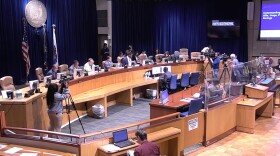Congress has until midnight Tuesday to extend a flood insurance program that covers nearly half a million Louisianans as a bitter showdown over the federal budget approaches a government shutdown on Oct. 1.
If it doesn’t extend the program, some members of the state’s federal delegation and statewide offices say it could spell disaster for residents, business owners and the larger real estate market as a whole.
The National Flood Insurance Program, or NFIP, is managed by FEMA and has been temporarily extended by Congress more than 30 times since 2017. It was created in 1968 to provide flood insurance to those who don’t have a private option, and has grown in size as most homeowner’s insurance policies across the U.S. have dropped flood damage entirely.
Louisiana leads the country in repetitive flood loss by a wide margin, and similarly has received the most money of any state in federal flood insurance since NFIP’s inception: over $20 billion.
As coastal erosion and sea level rise combine to intensify the impacts of flooding in coastal communities, that number is expected to rise even more.
Louisiana Insurance Commissioner Tim Temple will be in Washington, D.C. on Tuesday to urge the FEMA Review Council, formed by an executive order in January 2025, to extend the program — at least temporarily.
NFIP is also available to renters and business owners, and often serves as the main financial lifeline for communities recovering from storms packing heavier rain and more intense storm surge.
If left to expire, new policies won’t be issued until the program resumes.
Funding made available by the U.S. Treasury Department to pay claims would also drop by $30 billion overnight, leaving just over $1 billion for the program. In 2024, the program spent so much on claims that it was entirely depleted and had to borrow an additional $2 billion to cover those still pending.
Some insurance companies that make up the NFIP network have, in recent years, pushed for reform. But they also say those bigger-picture questions shouldn’t come now, with the pivotal funding deadline looming and potentially at the expense of coastal communities during the traditional peak of hurricane season.
Republican U.S. Sen. Bill Cassidy has long advocated for a permanent extension. In mid-September, he told Senate colleagues that if the government indeed allows a shutdown and NFIP lapses, it will quickly become a national problem.
“Where does that leave the elderly folks in Calcasieu Parish? Or the young couple buying their first home in Lake Charles Parish? We cannot let a congressional funding fight keep them from receiving the coverage they need,” Cassidy said.
CORRECTION: An earlier version of this story incorrectly stated that those enrolled in NFIP with contracts up for renewal would not be able to continue their coverage. As long as the program remains lapsed and the federal government is shut down, those up for renewal can keep paying and not lose coverage.










